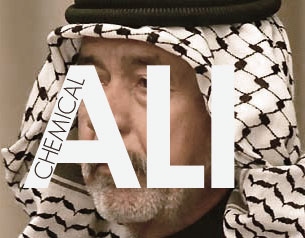Chemical Ali
Saddam's Cruellest Henchman
 The definitive account of Saddam's use of chemical weapons, and the atrocities his sidekick "Chemical Ali" performed in the name of the Ba'ath Party. Coupling eyewitness accounts with rare archive, we bring alive the horrific reality of campaigns made against his own people. Now they say they "want to be the proof of Saddam's crimes". Shocking and slick profile of what must be one of the cruellest men of the late 20th Century.
The definitive account of Saddam's use of chemical weapons, and the atrocities his sidekick "Chemical Ali" performed in the name of the Ba'ath Party. Coupling eyewitness accounts with rare archive, we bring alive the horrific reality of campaigns made against his own people. Now they say they "want to be the proof of Saddam's crimes". Shocking and slick profile of what must be one of the cruellest men of the late 20th Century.
As morning broke on 16 March 1988, crowds slowly emerged from cellars thinking last night's bombardment was over. Whilst making breakfast; "we heard a large explosion, people fell on one another". Rushing back into the dark underground they were unable to escape; "white smoke slowly came in". "We started to cough, the children began to vomit, the animal's stomachs were shaking." They had been gassed, and this is Halabja.
Chemicals were a key weapon for Saddam. With cousin Ali in command he could put down insurrections quickly and easily. The Shia uprising in 1991 was one of Saddam's weakest moments. "Basra fell into our hands. The police, the security services, were all done for", recounts Ebedulrehhem Salim. But then Ali Hassan Al Majeed, otherwise know as known as "Chemical Ali" or "the Damned" turned up. "They gathered the young people, tied them up with ropes, and blindfolded them. They shot them in public to frighten the people. Ali regained control of the province."
Such tactics were not new. "Chemical Ali" perfected them over the years. Attacks were made against all sections of society that might threaten Saddam. "Anfal" was the attempt to eradicate the Kurds from the far North of Iraq. "They surrounded our village with planes, ground troops, tanks and soldiers. We were to be killed." Ali boasted on Iraqi media that his soldiers would; "take two thirds of the Kurds and hit them with chemicals until they die", and he wasn't exaggerating. During the Anfal campaign 182,000 people lost their lives.
Ali's use of chemicals was just one component in Saddam's programme of Kurdish eradication. Summary executions and torture were commonplace. Jaleel Abdilkereem, a former inmate of Kirkuk prison remembers how he used to say; "for God's sake" as he was tortured. They'd say; "not allowed. God is on vacation". So he shouted; "for Muhammad's sake". But; "they would call out for someone named Muhammad, and Muhammad would take over the beating." He smiles now, but with a grimace.
What is most striking are the sheer numbers of people affected. In those areas of Iraq in which Ali had free reign, whole generations of men and young girls were lost. "Only Saddam Hussein's name strikes as much terror in the hearts of Iraqis as Ali Hassan Al Majeed". Relatives tell of the moment when loved ones were dragged away as if it had just happened. The pain is still raw. "Bring Chemical Ali and Saddam Hussein to the Anfal families and let us get even with them".
The marshes are starting to; "breath again, and recover from their scars". New children are being born that cannot remember the smell of gas but it will be a long time before Iraq forgets the name "Chemical Ali". As one victim explains; "Those of us who returned are as good as dead. Because if you cannot eat or sleep... why live? I have not seen a happy day since Halabja. Our dead are more at peace than us. It was one day, one moment, they died. But we are dying every day".
FULL SYNOPSIS
